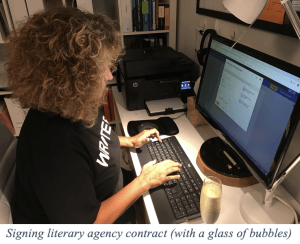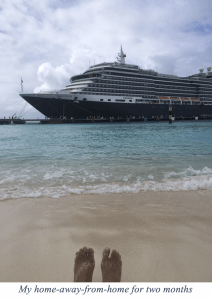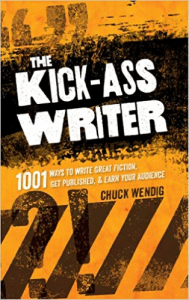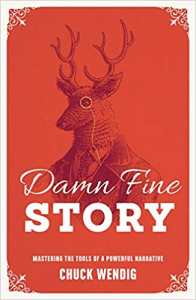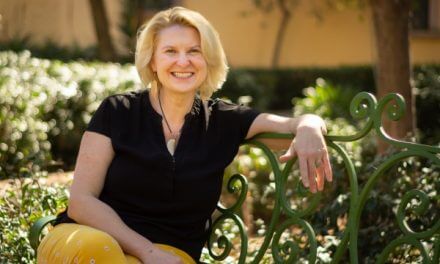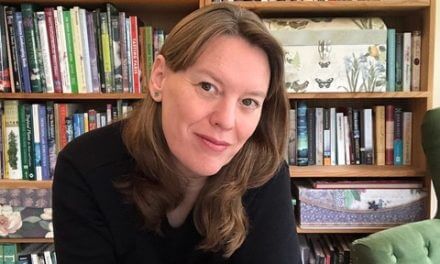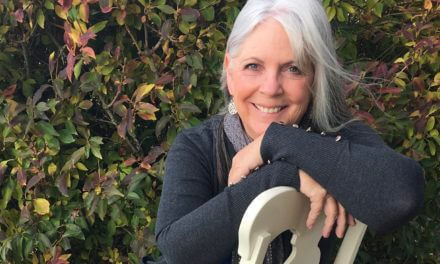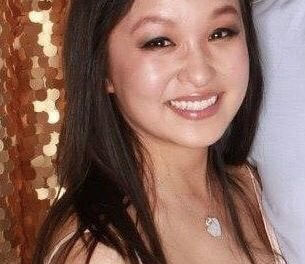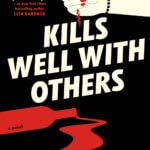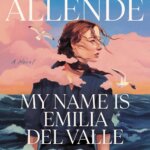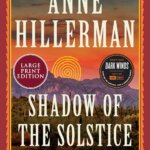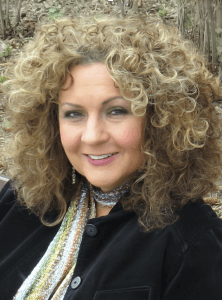
Kristin, how long have you considered yourself a writer? Did you have any formal training, or is it something you learned as you went?
KO: The last writing class I took was English composition back in college, circa 1987. I wish I had that text book now, since I continue to have a bad relationship with commas. I had academic pieces published whilst I was in the university world. But writing fiction? Not until 2016. And I no longer use the word ‘whilst.’
SS: How do you give back to the writing community?
KO: I think this is a great question and one which should be asked more. Instead of a short answer, here’s a little story: Writing is a wackadoodle lonely process, and as an organized extrovert I wasn’t prepared for so much ambiguity and silence. So, I shamelessly and loudly reached out to writers for help. And lucky for me, they did.
For example, I met Jessica Strawser, Writer’s Digest Editor-at-large, at my first ever writing conference (Northern Colorado Writers). We chatted in the hallway, and she encouraged me to submit an essay to Writer’s Digest. I did, and it was published. Nothing feels as good as that kind of validation. Also, Janet Reid, the Query Shark and literary agent, always answered my questions on her blog. Sometimes the answers were sweet, sometimes funny, and once or twice irritated, but she always encouraged and certainly helped me keep focus. Then there’s NYT best-selling author, Chuck Wendig, who I’ve run into several times at conferences. He always recognizes me (it must be my hair) and asks how my writing is going. He makes me feel like a legitimate rockstar.
I know these are busy folks, but they took time to be nice. Which, I imagine, at the end of a conference or long day of book signing can sap their last smile. It may not seem like a big deal, but for a writer trying find her place in the traditional publishing world, it was huge. I remember this always. Now, with some experience under my own belt, whenever I give a conference presentation or teach a class, I try to help new writers see the possibilities. Even when they can’t themselves. Sometimes it just takes someone else (besides a loving, patient spouse) to believe in your work, or at least say, “It’s going to be all right, pumpkin.”
SS: Do you generally write in one genre? If so, what is it? And what can readers expect from one of your books?
KO: I’ve been told by publishing professionals my novel-length work lands safely in women’s fiction. But I think there’s a side of cozy mystery and adventure too. In all my work, I love writing about perspectives and the challenges we have understanding other’s choices. We are so quick to judge and have strong opinions; we really never think about consequences others have faced. Since I’m particularly guilty of this, I like incorporating it into my work since it will feel authentic and resonate with the reader.
SS: Do you ever incorporate something that happened to you in real life into your novels?
KO: Absolutely! My travels, especially on cruise ships, and wine background help of course. Oftentimes dancing (I was an outstanding tap dancer. Think Fosse, not Irish clogging) cha-chas its way in there too. I feel confident writing topics I know a lot about, so I tend to weave these into my work.
SS: Do you hide any secrets in your books that only a few people will find?
KO: Since I love clever things, there are anagrams and Easter eggs hidden throughout.
SS: Do you think that self-revelation is part of the writing process?
KO: I would hope so, since writers would never grow otherwise. Except width-wise.
SS: Are you looking to entertain or illuminate?
KO: Both. Preachy books don’t sit well with me, they feel very in-your-face. So, if I have any messaging, I usually strategize how to get it across in an unobtrusive way. I hope my writing connects with people first as “fun” and then as, “oh, I never thought about that.” I find writing humor successfully takes two people. You need to establish a relationship of trust with your reader for them to buy anything on the page. I hope to have that kind of connection with my readers.
SS: Do you believe you write the kind of book you’d want to read?
KO: Yes. I want to travel, get lost, eat, and learn … and read all about it in an engaging way. I have a very short attention span, which I think helps me with plotting, action, and keeping things appealing. If I’m bored, the reader will be too. Usually, if I’m not into a book by page 10, it’s donated. I don’t ever want to walk into a Goodwill and see a collection of my books.
SS: Can you share with us a bit about the moment when the idea for your novel first popped into your head? Did the idea come to you all at once, or did different pieces of the story come to you over time?
KO: My first novel occurs on a ship and the story originated on a Russian cruise on the Baltic Sea. Sounds exotic, right? But the luxurious ship, food, and fancy passengers made me feel very awkward. I didn’t feel like I quite fit in. Also, part of me felt uncomfortably lazy taking this fabulous trip, so I tried to justify a way to ‘earn’ it. Write some travel articles? A blog? What about a book? I still have twenty-six pages of handwritten notes from that particular cruise and most made it into the novel. Plus, the main character’s discomfort. Now, after a few cruises, I love seeing the world on a ship and my grateful feelings outweigh all others.
SS: Do you know the ending to your story when you put pen to paper?
KO: I admit I’m a plotter. I love markers, highlighters and poster board. I adore Excel spreadsheets. Don’t judge. BUT that being said, whenever I start a new book, the first sentence organically spills onto the screen. In fact, the first sentence of my first book hasn’t changed a lick. And the ending? Same too. I tend to bookend my stories, kind of like guardrails, so I have something to write from and end at.
SS: How important are romance and romance tropes in women’s fiction? Do you ever feel the need to break free of their constraints?
KO: I’m not a big fan of the label “women’s fiction” because it stereotypes gender. And any “emotionally-layered journey” can be had or enjoyed by any reader. I think it short-sells our work as female writers. My main characters are on journeys of self-actualization; they don’t need romance to steer them in the appropriate direction. All my novels pass the Bechdel test. That being said, I do belong to Women’s Fiction Writers’ Association, because I want to support women writers and their work. I would hope someday my books are shelved in the “Fun Fiction” or even “Campy” bookstore sections, because those are the aisles I would run to waving cash. And they have nothing to do with gender.
SS: Do you think political statements belong in women’s fiction?
KO: As humans, we are creatures with opinions. I can’t see how our belief systems wouldn’t find their way into our writing. “Good writing describes the human condition which resonates with readers.” Ohhh, I like that. I think I’ll use that again.
SS: What advice would you give aspiring writers?
KO: It’s hard. No kidding. I’d rather earn a Ph.D. all over again. Keep at it. The more you write, the better you get. There are no short-cuts. Join a critique group and establish trust. Meet regularly. Listen. Make friends with other writers. Go to conferences. At some point, it will all stick. Grow your confidence.
SS: Are there any books on writing you find particularly useful and would recommend?
KO: Chuck Wendig’s The Kick Ass Writer and Damn Fine Story are favorites I continually reference. He doesn’t mess around and serves it straight up like a good whisky. Angie Hodapp’s Do You Need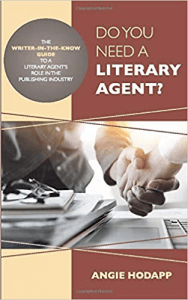
********************
Kristin can be found here on social media:
Twitter | Facebook | Instagram | Website
All links in this article are Amazon links.
